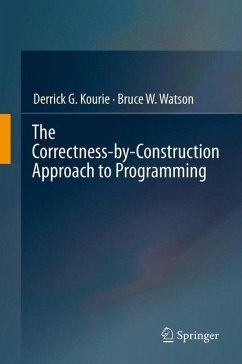
Const-correctness
Versandkostenfrei!
Versandfertig in 6-10 Tagen
23,99 €
inkl. MwSt.

PAYBACK Punkte
12 °P sammeln!
Please note that the content of this book primarily consists of articles available from Wikipedia or other free sources online. In computer science, const-correctness is the form of program correctness that deals with the proper declaration of objects as mutable or immutable. The term is mostly used in a C or C++ context, and takes its name from the const keyword in those languages. The idea of const-ness does not imply that the variable as it is stored in the computer's memory is unwriteable. Rather, const-ness is a compile-time construct that indicates what a programmer may do, not necessari...
Please note that the content of this book primarily consists of articles available from Wikipedia or other free sources online. In computer science, const-correctness is the form of program correctness that deals with the proper declaration of objects as mutable or immutable. The term is mostly used in a C or C++ context, and takes its name from the const keyword in those languages. The idea of const-ness does not imply that the variable as it is stored in the computer's memory is unwriteable. Rather, const-ness is a compile-time construct that indicates what a programmer may do, not necessarily what they can do. In addition, a method can be declared as const. In this case, the 'this' pointer inside such a method is of const ThisClass const type rather than of This Class const type. This means that non-const methods for this object cannot be called from inside such a method, nor can member variables be modified, nor can non-const methods be called, if they are of class type. In C++, a member variable can be declared as mutable, indicating that this restriction does not apply to it. Mutable member variables can be used for caching and reference counting, where the logical meaning (state) of the object is unchanged, but the object is not physically constant since its bitwise representation may change.












